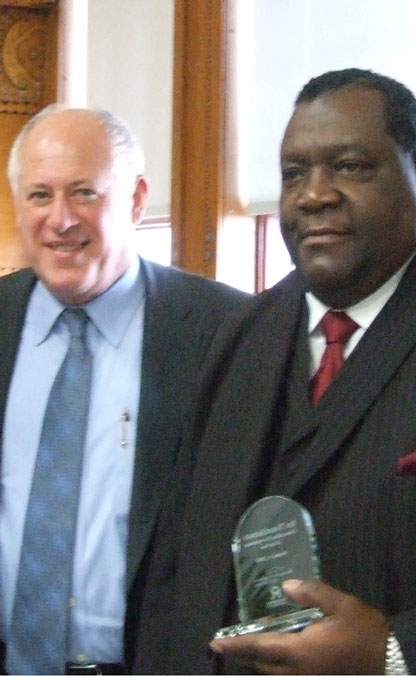Lillian and Larry Goodman Foundation and Roosevelt University Partner for Drug Prevention; TASC’s Peter Palanca Moderates Panel Discussion; Rev. Tommie Johnson Honored
(Chicago, IL) — Illinois Governor Pat Quinn, Chicago Sun-Times columnists Bill Zwecker and Neil Steinberg, and numerous drug prevention advocates gathered at Roosevelt University on October 11 to discuss stigma and solutions in preventing substance abuse.
Overlooking Grant Park and Lake Michigan on Thursday afternoon, Roosevelt’s Murray Green Library Auditorium was filled with more than 200 parents, students, social workers, and community leaders concerned about substance abuse that is harming youth in rural, suburban, and urban areas alike.

Governor Pat Quinn congratulates TASC’s Tommie Johnson on being honored as an Outstanding Preventionist by the Lillian and Larry Goodman Foundation.
Governor Pat Quinn attended Friday’s symposium and listened to the impassioned voices of family members and prevention specialists. The Governor offered opening remarks and spoke to traditions of democracy, including the necessity of protecting children from drugs. “Everyone’s life is special,” he said. “We don’t ever, ever want to leave a person behind.”
The afternoon symposium and panel discussion, emceed by Chicago Sun-Times columnist Bill Zwecker, focused on stories and strategies to save children from addiction.
“Every 15 minutes we lose one of our citizens to drug addiction,” said philanthropist Larry Goodman, who lost his granddaughter, Cebrin, to drug addition. “That’s four per hour, 100 per day.”
Larry Goodman and his late wife Lillian established The Cebrin Goodman Center in Cebrin’s memory to educate teens, parents, and communities about substance abuse and other issues affecting young people today. Cebrin died from a heroin overdose in 2002 shortly after graduating from college.
The Goodman family presented awards to Illinoisans who have performed extraordinary service in prevention. Robert Grupe received the Goodman Award for Excellence in Drug Abuse Prevention, and Marcia Doniger was honored with the Lifetime Achievement Award. TASC Recovery Support Services Coordinator Tommie Johnson was one of 10 people recognized as an Outstanding Preventionist of the Year. Through TASC and with his Outside the Walls ministry, Reverend Johnson gives hope and opportunity to people who have been incarcerated.
Keynote speaker Neil Steinberg, columnist for the Chicago Sun-Times, offered his personal perspectives as a person in recovery from alcoholism. As a journalist and writer, Mr. Steinberg had once viewed addiction and treatment mostly with an analytical eye. Then he was forced to go to treatment for his own alcoholism.
“Sometimes you do the right things for the wrong reasons,” he recalled. “I was a writer, writing a book, doing research.” A few weeks into the treatment program, to which he had submitted partially because it seemed an interesting experience worth recording, he acknowledged that he himself was addicted. “I realized, this really is a problem. I can’t stop drinking.”
Initially for the sake of his marriage, and ultimately for faithfulness to life itself, Mr. Steinberg stuck with the process of treatment and recovery. Describing settings and circumstances where drinking alcohol remains routine for others, he spoke to the truth of the “one day at a time” aphorism, which helps millions of people maintain their daily victories over brain signals that have been permanently altered by addiction. “I’ve got today locked down,” he said, “and I’m fairly confident about tomorrow, and after that, I’m still working on it.”
Following Mr. Steinberg’s remarks, TASC Executive Vice President and Chief Operating Officer Peter Palanca moderated a panel discussion on prevention. “There are many ways to get to where we want to get,” said Palanca, “and that’s to spare families from the pain and loss of a loved one.”
Sara Howe, CEO of the Illinois Alcoholism and Drug Dependence Association (IADDA) highlighted the importance of public policies to support effective prevention and intervention strategies and programs. She also emphasized that prevention must be community-based and tailored to the needs and norms of individual communities, and directly inclusive of youth voices and perspectives. For instance, the idea of IADDA’s Operation Snowball is that positive peer reinforcement can snowball from one youth to another.
Dr. Celeste Napier, director of the Research and Recovery Center for Compulsive Behaviors and Addiction at the Rush University Medical Center agreed that positive options and youth-centered messages work. ‘We need to tool our teenagers with these very good substitutions.They’re wired to be persuaded by their peers.”
Dr. Napier described the biological functioning of the adolescent brain, including natural tendencies toward risk-taking and susceptibility to addiction. When it comes to stigma around the use of different drugs, addiction is nonselective in whom it picks. “We’re talking about brain biology,” she said. “Addiction does not discriminate.”
Dr. Kristina Peterson, assistant professor of Counseling and Human Services at Roosevelt University, cautioned against complacency in prevention, intervention, and treatment. She advised prevention professionals and parents to stay informed and keep an open mind “because things change quickly and each person is different.”
Dr. Peterson told of an exercise she gives to her students to help them understand addiction. Students volunteer to go two weeks without using anything that can be addictive, and they keep journals to record the surprising challenges they face in, for example, living without caffeine for a few days. “If they’re going to be social workers, they have to know,” said Dr. Peterson.
Ed Stellon, senior director of the Heartland Center for Systems Change at the Heartland Alliance, spoke of the importance of open lines of communication with young people, and the healing power of trusting relationships. “It’s a process,” he said of youth who experiment with addictive substances. “At every point there’s an opportunity for intervention.”
From their perspectives as researchers, professors, practitioners, and parents, all the panelists agreed that the realities of addiction cannot be ignored. “Said Dr. Napier, “Our society is going to fail if we cannot get our hands around this addiction problem.”